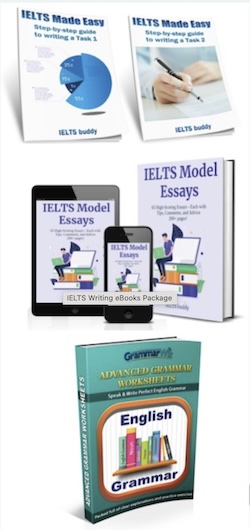IELTS Preparation Tips
by qwerty
I hope everyone who is preparing for IELTS reads these IELTS preparation tips a few weeks before sitting their exam. I got my results on Dec 18th and they are as follows:
L - 8.5
R - 8
W - 7.5
S - 7
Overall - 8
I just wanna tell you how I prepared for it.
Listening
I did 42 sample listenings in total. I can tell you that the Listening is all about practice and concentration, and to me, is the easiest part of the exam.
When you practice, don't forget to transfer your answers to an answer sheet. This will help you get used to it, which I believe is helpful in the exam.
If you feel unsure whether you need to put a capital letter or not, then simply write all your answers in capitals.
Reading
Unlike the Listening, where I've scored a 9 a several times, doing so in R is quite more challenging, though scoring a high point is not impossible. Here are my IELTS preparation tips:
Try doing the 3 passages and transfer all your answers to the answer sheet in 45 minutes. When I started doing this, at first I scored 6 and 6.5 on every test and I thought I'd never do better. However, over the time, I improved a lot, though my maximum on R was 8.5.
First you read the questions, underlining the key words. Then you start reading the passage from the very beginning and find the answers for the questions. There is no need to read the whole text as this will lose you a lot of time, though some questions may require you do so.
On my IELTS test, I used this technique and I did the first two passages in 30 minutes, which was useful, because the third one can be very difficult.
Try using different techniques and avoid searching the web for such as every person has their own way of dealing with the reading paper.
Writing
Writing is, like many would agree, the most challenging part of IELTS. I'll just give you some writing IELTS preparation tips and words of advice:
1. Find a teacher to check your work and don't waste your time looking for an "IELTS teacher" in the hope that such would be more of a help, because it is only the writing examiners who know how to mark IELTS writings. Although an IELTS teacher can be more familiar with the exam format, they will never be able to assess your writings, as will the examiners.
2. Try both tasks for 50 minutes and ALWAYS start with the essay, because it is worth twice as more as the other task. On my exam, I spent forty five minutes on my essay and although I didn't manage to finish my bar chart, I got 7.5.
3. Search the web for sample Band 9 essays and instead of thinking how you'll never get a 9, write down phrases you find useful. You'll see that linking words such as however, nonetheless and so on are rarely used in these. I even started my essay with a sentence I remembered reading in an essay online and no, it is not a problem, unless your answer is totally memorised in which case you'll get a band 0.
4. Think of common essay
5. Don't dive directly into writing without spending at least 5 minutes planning your answer. Begin with reading the question carefully, then think of how should you structure your essay and most importantly - don't forget to begin your essay with a sentence that is interesting. That way, you'll grab the attention of the reader.
6. I want you to know that it is almost impossible to achieve band 9 on writing and personally, I haven't heard of anyone who have done it. I know people with 8.5, but not with a 9, so just do your best, hope for the best and expect the worst. When I quit the exam room I thought I did very bad on W and I would get no more than a 6. When I got my results, I spend two minutes staring at the screen - I couldn't believe what I saw.
7. When you get your score and, for example, you have 7 on writing and you are fully sure that your answer deserves better than what you got, you can have your test reassessed, for which, of course, you will be charged. If you want this to happen, your work will be checked by another examiner and if your score changes, you will be refunded with all your money. I watched a video on YouTube about a boy, whose results were
L - 9
R - 9
W - 7.5
S - 9
He had no doubt his writing was too good for a 7.5, so he was charged and his work was reassessed, and guess what - his score increased up to 8.5. So, again, only if you are fully sure and willing to spend the money, get your test reassessed.
8. I recommend you buy the two eBooks offered by this website. I doubted if I really needed these, but it didn't take me much time to realise that my money was well-invested. Many students fail to achieve high band on W simply because they don't know what the examiners are looking for and since Cambridge seem to have neglected the writing part of IELTS, these two books will be of a great help to everyone, no matter which band they are aiming at.
Speaking
I practiced the Speaking with my teacher nearly 5 times, because I thought I would need more practice on the other parts. I wasn't surprised when I got a 7, though I am sure that if I had practiced more, I would have achieved a higher band. What you need to do is just find someone to speak to and do the whole exam with them many times.
Generally, as I think I've mentioned above in these IELTS preparation tips, IELTS is all about techniques. Don't waste your time and money buying grammar and vocabulary books as I think this is unnecessary. Make sure you've practiced enough before sitting the exam.
My email is bennyqwerrty@abv.bg. I'd be glad to help anyone who has trouble understanding something regarding the exam, though I won't be able to help with the speaking as I've been really busy recently.
Good luck everyone.
Comments for IELTS Preparation Tips
|
||
|
||
|
||
|
||
|
||
|
||
|
||
|
||
|
||
|
||
|
||
|
||
|
||
|
||
|
||
|
||
|
||
|
||
|
||













